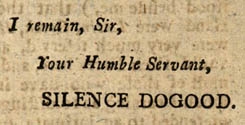By Nancy Heywood
 Many people have heard of Silence Dogood, and recognize that name as a pseudonym used by Benjamin Franklin, but how many people have read “her” words? The MHS has just launched a web exhibition, “Silence Dogood: Benjamin Franklin in The New-England Courant” featuring contextual essays about the topic as well as digital images and transcriptions of the 14 pieces appearing in a Boston newspaper between March and October of 1722 “by” the outspoken widow Silence Dogood.
Many people have heard of Silence Dogood, and recognize that name as a pseudonym used by Benjamin Franklin, but how many people have read “her” words? The MHS has just launched a web exhibition, “Silence Dogood: Benjamin Franklin in The New-England Courant” featuring contextual essays about the topic as well as digital images and transcriptions of the 14 pieces appearing in a Boston newspaper between March and October of 1722 “by” the outspoken widow Silence Dogood.
In 1722 Boston-born Benjamin Franklin was 16 years old and busy working as an apprentice for his brother James, the printer and publisher of The New-England Courant. The Courant wasn’t officially tied to the colonial government of Massachusetts and the newspaper became known for publishing opinionated, lively, and satirical pieces, some of which questioned the political and religious establishment. In his autobiography Benjamin Franklin remembered how he wanted to write for the paper but thought his brother wouldn’t accept or print any pieces he submitted. So Benjamin thought of a less direct method to get his writing published: he recalled, “I contriv’d to disguise my Hand, and writing an anonymous Paper I put it in the Night under the Door of the Printing House.” This “anonymous Paper” was the first essay written by “Silence Dogood” that was published as a letter to the editor in the 26 March-2 April 1722 issue of the Courant.
The appearance of Silence’s letter in the newspaper (followed by a note from the publisher, James Franklin, with suggestions to Mrs. Dogood about how to ensure the safe delivery of future letters to the newspaper) prompted Benjamin to continue writing. Over the next 7 months, thirteen more essays appeared in the newspaper. Silence Dogood shared her life story (see essay one to read a dramatic account of her birth on board a ship), advocated for the rights of women (essay 5), quoted a lengthy piece from a London newspaper about freedom of speech (essay 8) and commented on the vice of drunkenness (essay 12), which includes what is perhaps one of the longest lists ever compiled of all the harmless sounding terms used to describe a state of drunkenness: “boozey, cogey, tipsey, fox’d, merry, mellow, fuddl’d, groatable, Confoundedly cut, See two Moons, are Among the Philistines, In a very good Humour, See the Sun, or, The Sun has shone upon them … .”).
Also available within the MHS’s web presentation of the Dogood essays are links to online displays of the full issues of the 14 newspapers in which the essays appear. Website visitors have the opportunity to browse a few sample issues and see the output of the publishing house where Benjamin Franklin learned many aspects of the printing trade.

